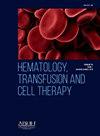计划性部分交换输血对严重镰状细胞病孕妇预后的影响:一项回顾性研究。
IF 1.8
Q3 HEMATOLOGY
引用次数: 0
摘要
简介患有镰状细胞病的妇女发生胎儿-产妇并发症的几率很高。由于缺乏高质量的证据,因此对妊娠患者的输血支持提出了有条件的建议。本研究旨在评估按计划进行部分红细胞交换是否会影响镰状细胞病患者的妊娠结局:根据患者是否接受计划的部分红细胞交换,将 47 例妊娠分为两组。收集的数据包括人口统计学、实验室值、医院就诊次数以及产前/围产期/产后结果。数据分析采用描述性统计、t 检验、卡方检验、费雪精确检验和二元回归法:平均年龄为(25.09±4.39)岁。在 47 名患者中,14 人(29.8%)接受了定期红细胞置换,依从性为 78.6%,且无异体免疫迹象。妊娠期进行这种手术与以下因素有关:因疼痛危机入院的人数较少(p=0.032)、分娩时胎龄较高(p=0.007)、新生儿重症监护入院率较低(p=0.011;几率比:0.071;95% 置信区间:0.008-0.632)。逻辑回归未显示任何显著关联:结论:既往妊娠中出现并发症(包括高住院/入院率和早产)的镰状细胞病患者可从定期部分红细胞交换或简单输血中获益。还需要进一步的研究来指导镰状细胞病孕妇的输血支持临床实践。本文章由计算机程序翻译,如有差异,请以英文原文为准。
Impact of scheduled partial exchange transfusions on outcomes in pregnant patients with severe sickle cell disease: a retrospective study
Introduction
The incidence of feto-maternal complications is high in women with sickle cell disease. The paucity of high-quality evidence has led to conditional recommendations for transfusional support in pregnant patients. This study aimed to assess if scheduled partial red cell exchanges impact pregnancy outcomes in sickle cell disease patients.
Methods
Forty-seven pregnancies were divided into two groups based on whether patients received scheduled partial red cell exchanges. Collected data included demographics, laboratory values, number of hospital visits, and prenatal/perinatal/postnatal outcomes. Data were analyzed using descriptive statistics, t-test, Chi-square and Fisher's exact tests, and binary regression.
Results
The mean age was 25.09 ± 4.39 years. Of 47 patients, 14 (29.8%) received scheduled red cell exchanges with 78.6% compliance with no evidence of alloimmunization. This procedure during pregnancy was associated with fewer admissions for pain crises (p=0.032), higher gestational age at delivery (p=0.007), and a lower incidence of neonatal intensive care admissions (p=0.011; odds ratio: 0.071; 95% confidence interval: 0.008-0.632). Logistic regression did not show any significant associations.
Conclusions
Sickle cell disease patients with complications in previous pregnancies, including high hospitalization/admission rates and preterm deliveries, could benefit from scheduled partial red cell exchanges or simple transfusions. Further research is needed to guide clinical practice pertaining to transfusional support in pregnant patients with sickle cell disease.
求助全文
通过发布文献求助,成功后即可免费获取论文全文。
去求助
来源期刊

Hematology, Transfusion and Cell Therapy
Multiple-
CiteScore
2.40
自引率
4.80%
发文量
1419
审稿时长
30 weeks
 求助内容:
求助内容: 应助结果提醒方式:
应助结果提醒方式:


